Fleurs du Mal Magazine


Or see the index
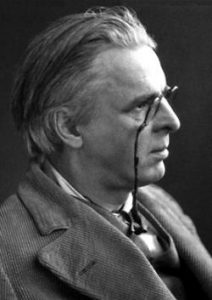
An Image from a Past Life
He. Never until this night have I been stirred.
The elaborate star-light throws a reflection
On the dark stream,
Till all the eddies gleam;
And thereupon there comes that scream
From terrified, invisible beast or bird:
Image of poignant recollection.
She. An image of my heart that is smitten through
Out of all likelihood, or reason,
And when at last,
Youth’s bitterness being past,
I had thought that all my days were cast
Amid most lovely places; smitten as though
It had not learned its lesson.
He. Why have you laid your hands upon my eyes?
What can have suddenly alarmed you
Whereon ’twere best
My eyes should never rest?
What is there but the slowly fading west,
The river imaging the flashing skies,
All that to this moment charmed you?
She. A sweetheart from another life floats there
As though she had been forced to linger
From vague distress
Or arrogant loveliness,
Merely to loosen out a tress
Among the starry eddies of her hair
Upon the paleness of a finger.
He. But why should you grow suddenly afraid
And start — I at your shoulder —
Imagining
That any night could bring
An image up, or anything
Even to eyes that beauty had driven mad,
But images to make me fonder?
She. Now she has thrown her arms above her head;
Whether she threw them up to flout me,
Or but to find,
Now that no fingers bind,
That her hair streams upon the wind,
I do not know, that know I am afraid
Of the hovering thing night brought me.
William Butler Yeats
(1865-1939)
An Image from a Past Life
• fleursdumal.nl magazine
More in: Archive Y-Z, Archive Y-Z, Yeats, William Butler

A Poet to his Beloved
I bring you with reverent hands
The books of my numberless dreams,
White woman that passion has worn
As the tide wears the dove-grey sands,
And with heart more old than the horn
That is brimmed from the pale fire of time:
White woman with numberless dreams,
I bring you my passionate rhyme.
William Butler Yeats
(1865-1939)
A Poet to his Beloved
• fleursdumal.nl magazine
More in: Archive Y-Z, Archive Y-Z, Yeats, William Butler
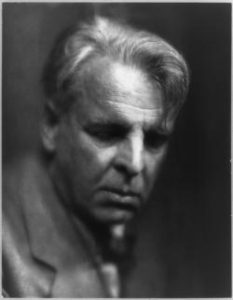
When Helen lived
We have cried in our despair
That men desert,
For some trivial affair
Or noisy, insolent sport,
Beauty that we have won
From bitterest hours;
Yet we, had we walked within
Those topless towers
Where Helen walked with her boy,
Had given but as the rest
Of the men and women of Troy,
A word and a jest.
William Butler Yeats
(1865-1939)
When Helen lived
• fleursdumal.nl magazine
More in: Archive Y-Z, Archive Y-Z, Yeats, William Butler

The Arrow
I thought of your beauty, and this arrow,
Made out of a wild thought, is in my marrow.
There’s no man may look upon her, no man,
As when newly grown to be a woman,
Tall and noble but with face and bosom
Delicate in colour as apple blossom.
This beauty’s kinder, yet for a reason
I could weep that the old is out of season.
William Butler Yeats
(1865-1939)
The Arrow
• fleursdumal.nl magazine
More in: Archive Y-Z, Archive Y-Z, Yeats, William Butler
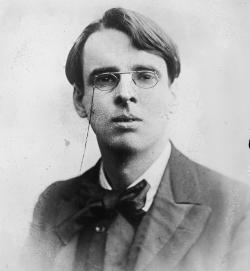
All Things can tempt Me
All things can tempt me from this craft of verse:
One time it was a woman’s face, or worse –
The seeming needs of my fool-driven land;
Now nothing but comes readier to the hand
Than this accustomed toil. When I was young,
I had not given a penny for a song
Did not the poet sing it with such airs
That one believed he had a sword upstairs;
Yet would be now, could I but have my wish,
Colder and dumber and deafer than a fish.
William Butler Yeats
(1865-1939)
All Things can tempt Me
• fleursdumal.nl magazine
More in: Archive Y-Z, Archive Y-Z, Yeats, William Butler
In the late 1880s, a dashing young Italian aristocrat made an astonishing confession to the novelist Émile Zola.
In a series of revealing letters, he frankly described his sexual experiences with other men—including his seduction as a teenager by one of his father’s friends and his first love affair, with a sergeant during his military service—as well as his “extraordinary” personality.
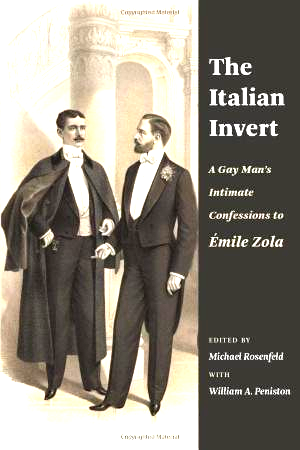 Judging it too controversial, Zola gave it to a young doctor, who in 1896 published a censored version in a medical study on sexual inversion, as homosexuality was then known. When the Italian came across this book, he was shocked to discover how his life story had been distorted. In protest, he wrote a long, daring, and unapologetic letter to the doctor defending his right to love and to live as he wished.
Judging it too controversial, Zola gave it to a young doctor, who in 1896 published a censored version in a medical study on sexual inversion, as homosexuality was then known. When the Italian came across this book, he was shocked to discover how his life story had been distorted. In protest, he wrote a long, daring, and unapologetic letter to the doctor defending his right to love and to live as he wished.
This book is the first complete, unexpurgated version in English of this remarkable queer autobiography.
Its text is based on the recently discovered manuscript of the Italian’s letter to the doctor.
It also features an introduction tracing the textual history of the documents, analytical essays, and additional materials that help place the work in its historical context.
Offering a striking glimpse of gay life in Europe in the late nineteenth century, The Italian Invert brings to light the powerful voice of a young man who forthrightly expressed his desires and eloquently affirmed his right to pleasure.
Whether you persist in reading it as a proto-naturalist novel (despite the opinions of the editors of this volume) or treat it as a sociological document, The Italian Invert is a classic text of nineteenth-century sexology the interest of which is by no means limited to French (or Italian) studies. (Melanie Hawthorne, Texas A&M University)
Michael Rosenfeld holds two doctorates, one in French literature and civilization from the Université Sorbonne Nouvelle–Paris 3 and one in French language and literature from the Catholic University of Louvain in Belgium.
William A. Peniston is the librarian and archivist emeritus at the Newark Museum of Art, as well as a historian of France. His books include Pederasts and Others: Urban Culture and Sexual Identity in Nineteenth-Century Paris (2004).
Nancy Erber is professor emerita of modern languages and literature at the City University of New York. With Peniston, she edited and translated Queer Lives: Men’s Autobiographies from Nineteenth-Century France (2007).
The Italian Invert
A Gay Man’s Intimate Confessions to Émile Zola
Edited by Michael Rosenfeld with William A. Peniston.
Translated by Nancy Erber and William A. Peniston.
Pub. Date: 5 July 2022
272 Pages
Format: Paperback
Publisher: Columbia University Press
Language: English
Paperback: 272 pages
ISBN-10: 0231204892
ISBN-13: 978-0231204897
List Price: £25.00
• fleursdumal.nl magazine
More in: #Biography Archives, - Book Lovers, - Book News, - Book Stories, Archive Y-Z, Émile Zola, LGBT+ (lhbt+)
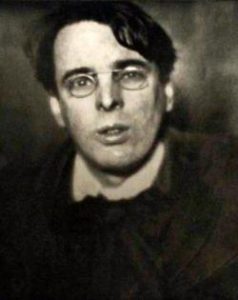
The Realists
Hope that you may understand!
What can books of men that wive
In a dragon-guarded land,
Paintings of the dolphin-drawn
Sea-nymphs in their pearly wagons
Do, but awake a hope to live
That had gone
With the dragons?
William Butler Yeats
(1865-1939)
The Realists
• fleursdumal.nl magazine
More in: Archive Y-Z, Archive Y-Z, Yeats, William Butler
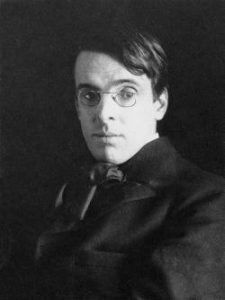
The Mask
‘Put off that mask of burning gold
With emerald eyes.’
‘O no, my dear, you make so bold
To find if hearts be wild and wise,
And yet not cold.’
‘I would but find what’s there to find,
Love or deceit.’
‘It was the mask engaged your mind,
And after set your heart to beat,
Not what’s behind.’
‘But lest you are my enemy,
I must enquire.’
‘O no, my dear, let all that be;
What matter, so there is but fire
In you, in me?’
William Butler Yeats
(1865-1939)
The Mask
• fleursdumal.nl magazine
More in: Archive Y-Z, Archive Y-Z, Yeats, William Butler

He tells of the Perfect Beauty
O cloud-pale eyelids, dream-dimmed eyes,
The poets labouring all their days
To build a perfect beauty in rhyme
Are overthrown by a woman’s gaze
And by the unlabouring brood of the skies:
And therefore my heart will bow, when dew
Is dropping sleep, until God burn time,
Before the unlabouring stars and you.
William Butler Yeats
(1865-1939)
He tells of the Perfect Beauty
• fleursdumal.nl magazine
More in: Archive Y-Z, Archive Y-Z, Yeats, William Butler

A Coat
I made my song a coat
Covered with embroideries
Out of old mythologies
From heel to throat;
But the fools caught it,
Wore it in the world’s eyes
As though they’d wrought it.
Song, let them take it,
For there’s more enterprise
In walking naked.
William Butler Yeats
(1865-1939)
A Coat
• fleursdumal.nl magazine
More in: Archive Y-Z, Archive Y-Z, Yeats, William Butler

Maid Quiet
Where has Maid Quiet gone to,
Nodding her russet hood?
The winds that awakened the stars
Are blowing through my blood.
O how could I be so calm
When she rose up to depart?
Now words that called up the lightning
Are hurtling through my heart.
William Butler Yeats
(1865-1939)
Maid Quiet
• fleursdumal.nl magazine
More in: Archive Y-Z, Archive Y-Z, Yeats, William Butler
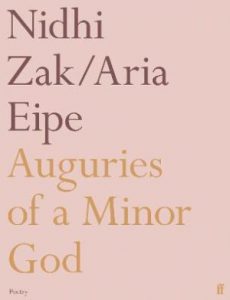 The debut collection of poetry from a virtuosic, compassionate new voice.
The debut collection of poetry from a virtuosic, compassionate new voice.
Nidhi Zak/Aria Eipe is a poet, pacifist and fabulist.
Born in India, she grew up across the Middle East, Europe and North America before calling Ireland home.
Founder of the Play It Forward Fellowships, she serves as poetry editor at Skein Press and Fallow Media, contributing editor for The Stinging Fly and an advisory board member of Ledbury Poetry Critics Ireland.
She is the recipient of a Next Generation Artist Award in Literature from the Arts Council of Ireland and the inaugural Ireland Chair of Poetry Student Award.
Nidhi Zak/Aria Eipe’s spellbinding debut poetry collection explores love and the wounds it makes. Its first half is composed of five sections, corresponding to the five arrows of Kama, the Hindu God of Love, Desire and Memory. Each arrow has its own effect on some body – a very real, contemporary body – and its particular journey of love.
The second is a long narrative poem, ‘A is for [Arabs]’, which follows a different kind of journey: a family of refugees who have fled to the West from conflict in an unspecified Middle Eastern country. With an extraordinary structure, yoking abecedarian and Fibonacci sequences, it is a skillful and intimate account of migration and exile, of home and belonging.
Auguries of a Minor God
by Nidhi Zak/Aria Eipe
Publisher: Faber & Faber
September 7, 2021
Language: English
Paperback: 120 pages
ISBN-10 : 0571365566
ISBN-13: 978-0571365562
£10.99
• fleursdumal.nl magazine
More in: #Modern Poetry Archive, - Book News, Archive E-F, Archive E-F, Archive Y-Z, Archive Y-Z
Thank you for reading Fleurs du Mal - magazine for art & literature